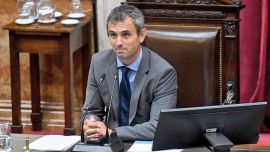The idea that Javier Milei is a king without a crown is being presented by those opposed to his government in the aftermath of his first major political moves which appear to somehow undermine the legislative power. Whether purposeful or not, Milei, Argentina’s outsider ultra-libertarian president, seems to be outsmarting the “caste” by turning weakness into strength. Overanalyzed as it is, as is everything related to this new government, it appears brilliant but seems to be masking quite the opposite, desperation. While the political class and the media have spent days debating the DNU emergency decree and the so-called “omnibus” law which seeks to fully deregulate the economy, whether it is constitutional or not, and whether it conforms with the processes and best practices of democracy, the real issue lies elsewhere - how long will society be able to tolerate such an aggressive correction which will see its already beleaguered purchasing-power completely pulverised? Will Milei and his ragtag coalition, La Libertad Avanza—few of them remain—and the patchwork cabinet be able to contain a growing social crisis which their political opponents will try to leverage against them? If 2023 was the year of the libertarian revolution in Argentina, 2024 promises to be the year in which the people will have a real taste of it.
With a level of hyperactivity suggesting he understands there is no time to be lost, President Milei has launched what appears to be one of the most ambitious set of reforms any Western democracy has seen in decades, maybe ever. The combo of a DNU and “ley omnibus” bill count with nearly 1000 dictates, a wide-ranging package of reforms which has been framed by the Milei administration as an absolute condition in order to avert a catastrophe by liberating the productive forces and animal spirits of the economic actors. They came a week after Economy Minister Luis ‘Toto’ Caputo unveiled an economic plan that including a massive devaluation together with a policy path which seeks to achieve a budget surplus through tough austerity and the dilution of peso-denominated obligations through fierce inflation. Both in his inauguration speech and in the few public appearances since taking the Presidency, Milei was explicit about the need for shock therapy in order to deal with massive price distortion and as a prerequisite to jumpstart Argentina’s economy.
Seen together, this set of policies are the basis for what the nascent Milei administration plans to achieve during its four years in power. While many issues appear urgent and necessary, many others seem frivolous or unnecessary. The method utilised by Milei is also unnatural, not only using an emergency decree but also packing the DNU and the law with so many pieces of information that they are ultimately rendered indecipherable for the majority of the people, including most legislators. All of these are signs which should be taken together to understand how Milei, sister Karina, and his team view their mission, but also how they can achieve it. It’s not just economic shock but also political.
While many see in this strategy certain totalitarian traits, they seem to suggest a level of self-awareness regarding this government’s political weakness, together with an understanding that a smart communications strategy could be their only hope in keeping the political support earned at the ballot-box. The strategy is the same that swept them to the Casa Rosada in the first place and one of the oldest political tricks in the books: find an enemy and blame them for everything. That enemy is the “caste” which has extended beyond the political class and has become anyone opposed to this government, including the media. The concept is so powerful and most socio-political actors are so terrified at being singled out that they prefer to hide their heads in the sand.
Trying to push the DNU and the bill are an attempt to capitalise on the scarce political capital Milei and his government have, probably with the knowledge that the chances of legislative failure are almost guaranteed. The amount of things they packed into those bills suggests that the bigger the document, the more it symbolically showed that Milei is truly going after the privileges of the caste. The fact that the political class and the media have spent days debating the constitutionality of Milei’s policy strategy plays i to his hands, masking the fact that with weak minorities in both chambers of Congress and a Supreme Court which has already indicated it will act if it senses that norms are being broken, the president will be forced to negotiate. The next step, a plebiscite, is more of the same.
The Milei administration will try to surf the next few months as the economic situation becomes direr by trying to keep ahead of its political opponents in the eyes of its electorate. The pan-Peronist Unión por la Patria coalition is scrambling to figure out how to respond, along with union leaders and social movements already starting to organise protests against the government. Yet, one thing is a march of 5,000 and another a mobilisation of 50,000 including the middle class.
Across the aisle, Juntos por el Cambio is struggling to remain together as a bloc, despite a de facto schism between PRO party hardliners, the Radical Cívica Unión and independents like Miguel Ángel Pichetto. They are bound at the hip to Milei given their anti-Kirchnerite essence but it seems difficult that they could maintain unity in the face of this policy path.
Milei knows the clock is ticking and is therefore moving as fast as he can. The opposition is still disoriented, trying to figure out what hit it and what the best way to respond is. Being outsmarted by an outsider, they “don’t see it,” as Milei suggests, leveraging his modern communications strategy that, via social media, penetrates deeper than the traditional politician’s speeches. A president can’t live off its social media popularity, though.



















Comments